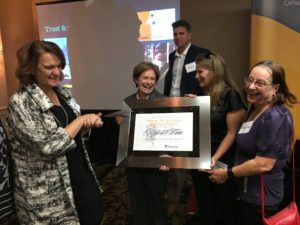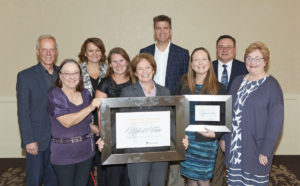|
Getting your Trinity Audio player ready...
|
When it comes to construction, Habitat for Humanity Waterloo Region is an organization that clearly knows how to get things done with bricks and mortar.
But the well-respected group, which has been mobilizing community partners in building affordable housing since 1988 to break the cycle of poverty, has shown it can also build on its internal strengths by winning Capacity Canada’s Manulife Governance Excellence Award.
The annual award recognizes outstanding board work in Waterloo Region’s charitable non-profit sector and was presented Nov. 16 at a reception to kick off Capacity Canada’s Manulife Board Governance BootCamp held at the Holiday Inn Kitchener-Waterloo Conference Centre. The two-day event, the largest to date held in the Waterloo Region, provided training and information to help board leaders and top administrators in the non-profit sector better understand their roles.

“We were absolutely thrilled to receive it,” said Karen Redman, CEO of Habitat for Humanity Waterloo Region, who accepted the award along with several of her colleagues.
Her group was among nine nominees for the award which is presented to an organization that implements new ideas and concepts to improve their overall board governance after attending a BootCamp event. Redman said four board members from Habitat for Humanity attended one of Capacity Canada’s BootCamps in 2016 and came away with many great ideas. The award included a $5,000 unrestricted prize.
“I think Capacity Canada has given us a roadmap on how we can improve and we’ve really embraced it,” said Redman.
Fred Galloway, a long-time member of Capacity’s BootCamp faculty, was among a panel of judges involved in the selection process and said he was impressed by the work of all the nominees. However, he said Habitat for Humanity took the training they received and implemented new concepts in a relatively short period of time.
“One of the things I always look for is evidence of pace and are they moving the bar, and how big was the leap. In Habitat’s case, it became very evident that they had got their arms around this and moved it a fair ways,” he said, noting they didn’t try to make too many changes all at once.
“I always look to see if they want to go from A to Z way too quickly, which means they won’t get there. The intent may be right, but the processing is probably not going to be effective.”
Habitat’s process revolved around identifying gaps and improving four areas in board governance.
These included board restructuring, including the overall size of the board and its impact, plus a re-evaluation of the board committees.
As well, board efficiencies surrounding the meetings themselves and an integrated calendar of board and committee work plans were addressed.

Habitat for Humanity also looked at board responsibilities and started talks on creating concrete yearly goals to expand upon the high level of Strategic Plan the organization created in 2016. Also, a new CEO evaluation was created in order to create timely and measurable objectives for 2017.
“We very much internalized it,” said Redman, who welcomed the new evaluation.
And finally, the issue of board development was met head on when the organization held a ‘mini’ board governance BootCamp in June of 2017 with Capacity Canada’s help for all its board and committee members. During this time, a new set of improvement opportunities for the board to implement were identified.
Redman said Habitat for Humanity has now had at least eight people, including senior staff and board members, participate in a Capacity Canada BootCamp.
“We’ve had a critical mass of people who’ve looked at the gold standard and thought we need to keep improving,” she said.
Galloway said there will always be the need for improvements in the non-profit sector.
“This is a very dynamic environment. There are always new regulations coming all the time from the federal and provincial governments, and sometimes from municipal governments, as well as funders and foundations,” he said. “The work will never be done.”

